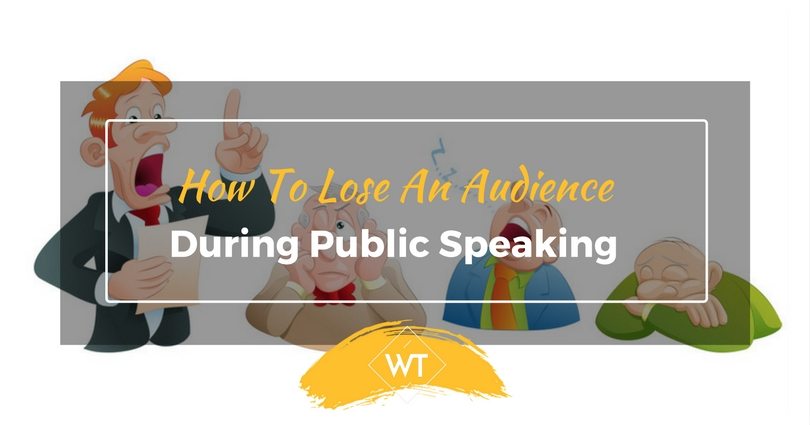How To Lose An Audience During Public Speaking


Want to know how to lose an audience? Skip this list—the one I have below, and you will do just that! And it’s never the obvious either. Take a look!
There’s not much point in spinning a yarn if your audience keeps losing the thread. ~ P.K.Shaw (Tweet this)
Table of content
- The greatest secret of public speaking
- The second secret to public speaking
- What does public speaking look like
- Public speaking habits- Does practice makes it perfect?
- Public speaking- Expect the unexpected
- How to use storytelling for public speaking
- Public speaking tips- From the stage to the podium
- How to lose an audience during public speaking?(This post)
Go get coffee
I often ask my coaching clients: “What is the very first thing you do when preparing a speech?” It seems like a straightforward question, but I seldom get a straightforward answer. The answers range from, “I go get another cup of coffee,” to “I suddenly find all kinds of other tasks that demand my immediate attention,” to “I start clearing off my desk in the name of creating space for thought.”
I get it, I do. Procrastination is the name of the game! But procrastination works for just so long . . . until the moment of truth, where preparation must replace procrastination. Then I try another question. “What is the first thing you consider when tackling the speech?” Here, I usually get some mumblings about the subject matter or more research on the topic at hand. This is to be expected.
Like good school children, we are given an assignment and we take it literally: “Write about this or that; explain the history of XYZ; write a book report to be delivered with an outline.” But unlike school children, who are always writing for a teacher, someone who knows the subject better than we do, we must approach our speech from the perspective of the knower, not the one trying to impress.
Speech belongs half to the speaker, half to the listener.~ Michel de Montaigne (Tweet this)
Help! They’ll see through me
This is a hard habit to overcome. Suddenly, a perfectly-competent person . . . one who has the respect of colleagues and competitors alike . . . will start doubting herself, will start acting like the audience will discover him to be a fraud!
This is everyone’s worst nightmare at the podium. “They will find out I don’t know enough.” “They will learn I’m an imposter.” “My façade will be revealed for what it is—a hoax.” Even the competent expert has knocking knees when the result of their analysis and presentation may mean the loss of millions for their own client.
Nerves are a part of the game. But preparation, if tackled appropriately, will channel those nerves towards excitement, moving from dread to delight.
Then I try other questions: “How do you feel about your topic? Does it excite you? Do you own it? The answer to these questions are revealing. If you don’t get excited by your topic, how can we, the audience? If you don’t own it, imbuing it with your personality—with your expertise—why should we be listening to you?
The better questions
By now, you may recognize yourself in some of these behaviors. So here are the better questions to ask BEFORE preparing a speech:
- Who is my audience? How much do they know about my subject? How much do they want to know?
- Are they decision makers? Technical folks? Do they want details or just the big picture?
- How will they act upon my message? Am I offering action steps?
- What is the purpose of my speech? To inspire? To lead? To change? To entertain? To inform?
- What is my role? To be neutral—just laying out the facts? To persuade—perhaps to change minds and hearts? To engage, so that they will have a new perspective?
Asking the right questions
I was once told by a client (who admitted he had been reluctant to take the time to rehearse with me) that a colleague had said to him: “Work with Saskia. She asks good questions!”
Indeed, I have found over the many years of coaching keynote speakers and key people that when you ask the right questions of yourself, the arc of your preparation becomes clear. You are no longer just working the details. You now have a vision of what you’re preparing and why it matters. For without a vision for the talk, the facts serve little purpose.
The old adage of the stage, “Leave them laughing,” is a vision of sorts—as is, “Leave them wanting more.” But the overall vision must first be something that is very clear to YOU. For that is what preparation is all about—not just the words, the organization, the structure, but where you want to end up and how you plan to get there.
The arc in a speech is like the arc of a musical phrase. The music comes not from just the notes but from the arc of the melody. So, too, in speaking: words are the building blocks, but the message comes from what you imbue them with: wit, charm, emotion, vision.
How to lose an audience
Many of us assume that a boring speaker is the one who will lose an audience. But what I have come to understand, not in a sudden flash of insight but in a slow dawning in my own awareness, is this:
It is not the speaker to who bores the audience that fails; it’s the speaker who bores HIMSELF that fails.
Boredom is an inside job. This may seem obvious when stated openly, but it took a long time for me to discern it. Only when we cannot relate to our own words do they put the audience to sleep. When we are engaged, passionate, having fun; when we care deeply about our topic and our audience; when we are enjoying ourselves . . . then and only then do we offer the audience a thing of value.
Everyone would like to enjoy their moment at the podium. And I say the only way that that can happen is to make sure you are asking the right question (and, of course, answering them honestly). Then you won’t have to worry about your own façade, for it cannot crumble when it is resting on a firm foundation. You also won’t have to worry about how to lose an audience—because you won’t!








Leave a Reply